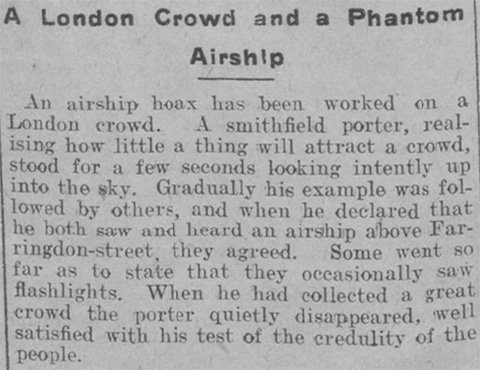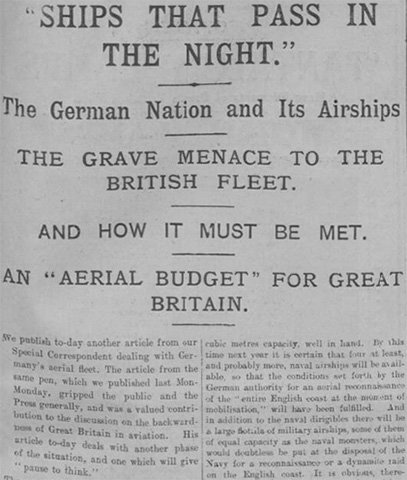
There is very little phantom airship news today. The Exeter Western Times reports on the airship seen over London on Friday night (p. 4):
An airship hoax has been worked on a London crowd. A smithfield [sic] porter, realising how little a thing will attract a crowd, stood for a few seconds looking intently up into the sky. Gradually his example was followed by others, and when he declared that he both saw and heard an airship above Farringdon-street, they agreed. Some went so far as to state that they occasionally saw flashlights. When he had collected a great crowd the porter quietly disappeared, well satisfied with his test of the credulity of the people.
This is very similar to the Chronicle's account as quoted by the Globe, but there are some significant differences. For example here the porter is said to have claimed 'that he both saw and heard an airship', whereas the Chronicle said nothing about hearing; similarly the Chronicle said nothing about any 'flashlights'. More significantly, the Western Times apparently has access to the porter's mental state, since it tells its readers how he 'realis[ed] how little a thing will attract a crowd' and that he was 'well satisfied with his test of the credulity of the people'. Perhaps that's journalistic invention or a rhetorical flourish; but it does raise the question of how this story of the porter hoaxing a crowd arose in the first place. It seems unlikely that it would have come from somebody in the crowd, so perhaps it was the porter himself who told the press. That would at least explain the Western Times's knowledge of his thought processes. But given the degree of egotism this would involve, the story's veracity may be questioned.
![]() This work is licensed under a Creative Commons Attribution-NonCommercial-NoDerivatives 4.0 International License.
Permissions beyond the scope of this license may be available at http://airminded.org/copyright/.
This work is licensed under a Creative Commons Attribution-NonCommercial-NoDerivatives 4.0 International License.
Permissions beyond the scope of this license may be available at http://airminded.org/copyright/.





Erik Lund
That is one weak-assed bit of push back there. Here's what I am seeing: war scares were a dime a dozen in the pre-1914 era. Some had large consequences, some less so. Arguably, they led to war as a causal mechanism in their own right.
But this "scareship" thing is a war scare on a very different level. Scares are usually offered to the community as commodities. "The Germans are about to invade, so we need conscription;" "We need Eight, and we won't wait!" Take them or leave them. With scareships, people are not just choosing to consume the scare. They're making more. It's not just pet rocks selling well, it's people getting rich selling pet rock accessories.
This is probably a pretty important pointer towards what communities get out of war scares.
(My guess, for what it's worth, is stimulative public sector spending in the mode of Keynes.)
Brett Holman
Post authorYes, that's what I find so interesting about mystery aircraft scares: they were participatory, not imposed, and so potentially give us some idea as to what ordinary people thought about questions of national defence and technological progress. And some idea of what they feared would happen in the future and, as you say, what they hoped would happen.
I'm not sure about proto-Keynsian pump priming, though. The economy was doing alright in 1913 (though not so well in 1909, the year of the previous airship scare); in particular unemployment was the lowest it had been since about 1900 (see here). Different regions might have been more depressed, though. Perhaps South Wales and Yorkshire were such areas; the one had a native airship builder in E. T. Willows (though he had decamped by then to Birmingham) and the other had the Vickers airship works at Barrow-in-Furness, well, across the border in Lancashire but not too far away). Realistically there was not going to be a great amount of employment from airship employment but then hopes are not always rational. Still, I don't tend to see it this way; as far as I can make out people who saw or discussed scareships were more worried about the German menace than about British industry.